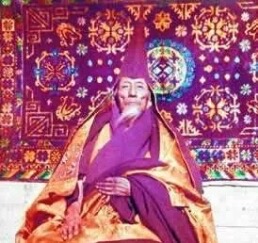The merits of Bodhicitta
1. The foundation of the great perfection – Bodhicitta
1.1.The merits of Bodhicitta
Bodhi means to purify and awaken. That is to say, this mind of ours, which gives rise to afflictions and dualism, can be transformed through the wisdom of Buddhism. Thereafter this deluded mind can awaken from the state of ignorant attachment, and the afflictions and dualism can be purified. In the process of purifying and awakening, we need to rely on other sentient beings as the object of our practice. When we are in contact with them all sorts of afflictions, dualism, and habits arise continuously. Thereby, our own ignorant attachment becomes evident and we can apply the wisdom of Buddhism as a means of transformation.
The difference between Bodhicitta and compassion is that Bodhicitta is far broader and vaster. Apart from the very profound compassionate wish to benefit all sentient beings, there is the understanding that if we ourselves do not attain enlightenment, then we do not have the ability to help others attain true enlightenment. Hence, we vow to attain Buddhahood ourselves in order to be able to lead other sentient beings on the path to Buddhahood.
Bodhicitta is fundamental to Mahayana Buddhism.
Our aspiration determines whether we are practising Theravada or Mahayana Buddhism. It is not determined by how the practice appears on the surface. If we have not assimilated Bodhicitta, then it does not matter what we are practising, we are not practising Mahayana Buddhism. Only when we give rise to genuine Bodhicitta can we claim to be a Mahayana practitioner. The Sravakas and Pratyekas of the Theravada tradition very skilfully and diligently practise emptiness.
The exoteric Mahayana and Vajrayana traditions also practise prajna or the wisdom of emptiness. It is unimportant whether the teachings are Mahayana or Theravada, if your aspiration to practise is to free only yourself from the suffering of samsara. It does not matter how diligent you are, nor does it matter how many years you have been practising, if you have not assimilated Bodhicitta, then the highest level you will attain is that of Arhathood of the Theravada tradition. Even if you are diligently practising the secret Vajrayana, if you have not assimilated Bodhicitta, there is no way you will attain Buddhahood. Only by practising the wisdom of emptiness as the foundation of Bodhicitta will you be creating the causes and conditions for attaining Buddhahood.
With aspiring to Bodhicitta we have the opportunity to practise all forms of positive deeds. With Bodhicitta in action not only does great compassion arise within us when we see the suffering of other sentient beings, in addition, the very determined aspiration of being prepared to undertake all sorts of responsibilities to help liberate sentient beings from suffering manifests itself. This intense feeling of responsibility will be the driving force for us to take action to benefit or save sentient beings in the six realms. Due to this, we will avoid falling into the three lower realms in our next life, and be reborn either in the human or god realm. Our habitual afflictions will slowly be overcome and, eventually, we will be free of them and quickly be able to perfect the path and attain Buddhahood. We will then become a guide that helps liberate sentient beings from the suffering of samsara and we will be successful in benefiting them in different ways.
This chapter is part of: Introduction Course - Part 2: Bodhichitta
